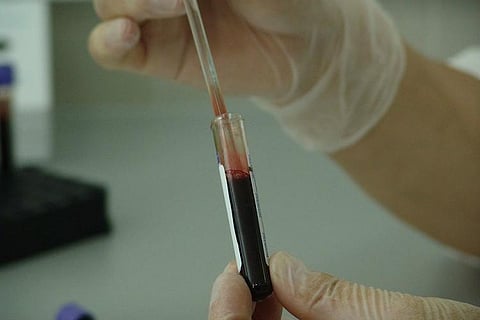

Over the last two weeks, Tamil Nadu has been in shock over the alleged negligence of a government hospital in Sivakasi district which failed to identify that blood donated to its bank by a 19-year-old who was HIV positive. To make matters worse, the youth had already donated blood at the very same government hospital in 2016, and was found to be HIV positive at the time. But, he was not informed and no follow-up was done. And as it turns out, this is not a one-off situation. Authorities at the Tamil Nadu State AIDS Control Society (TANSACs) confirm to TNM that every year, at least 10% of voluntary blood donors who are found to be HIV positive are not informed.
According to TANSACs, Tamil Nadu's government hospitals see blood donations from at least four lakh donors every year. While they have recorded data for the last five years, they confirmed the figures for three years to TNM. In 2015, of the 67 donors who tested positive for the virus, nine could not be informed of their condition. In 2016, eight out 52 HIV positive donors were not informed and in 2017, six out of 64 donors with the virus were not informed. And according to officials, there are a large number of reasons for this gap in communication.
“When blood is collected in large camps, people do not always give accurate contact information and therefore, counsellors or physicians at the testing centres cannot contact them,” says Dr Senthil Raj, Project Director, TANSACs.
“In other situations, even if our counsellors get a hold of them, they do not turn up at the centre. The third roadblock is the fact that we cannot inform them of their HIV positive status on the phone. It is an offence to do so. We need to bring them to the hospital somehow, get their consent and conduct three tests to confirm infection, as directed by the National AIDS Control Organisation (NACO)," he adds.
In the case of the 19-year-old blood donor, Dr Senthil Raj reveals that the hospital had indeed tried to contact him, but the staff were told that he is in Bengaluru.
"If donors move after donating blood, we don't have the resources to track them down," he admits.
No efforts to bridge gap?
The Human Immunodeficiency Virus and Acquired Immune Deficiency Syndrome (Prevention and Control) Act, 2017, says that a person who has tested positive for HIV should be informed of their condition in person by counsellors or physicians at the HIV Counselling and Testing Centres, but authorities argue that the Act applies only to those who voluntarily come in for tests and not for donors.
“Out of the donors we find to be HIV positive, we manage to contact 90% of the people. Yes, 10% may not be contacted but this is not a matter of worry. The gap is not a problem if there is a good testing process. And despite doing 4 lakh tests every year, the first time there has been an infection via blood transfusion in Tamil Nadu is the Virudhunagar incident. This was an aberration that is being investigated. There are no other such cases,” says Dr Senthil.
Blame game
However, P Kousalya, the president of the Positive Women Network in Tamil Nadu, an organisation which collaborates with the government to communicate with people who are HIV positive, states that this is far from true. She points to an RTI application filed by Mumbai-based activist Chetan Kothari to NACO, which revealed that '2,234 persons, including children, got HIV infection between October 2014 and March 2016 due to unsafe blood transfusion across India'.
“In Tamil Nadu itself there have been many allegations in the recent past, and so many people who have come to us. In 2017, an 11-year-old girl who came to Kilpauk Medical college for treatment of burn injuries was infected with HIV after blood transfusion. Following this, when she was moved to the multi-speciality hospital for surgery, tests revealed that she had the virus. But when parents confronted the staff there, they first said that the mother and father are hiding their HIV status,” narrates Kowsalya.
“Later when the parent took tests to prove them wrong, the staff alleged that the girl was raped. The problem is that our hospitals refuse to acknowledge the problem and try to shift blame. So we don't know the actual numbers.”